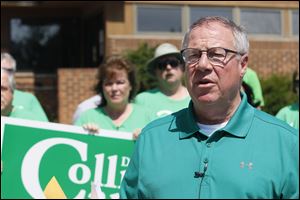
Collins details his plans for neighborhoods, economic growth
8/26/2013
D. Michael Collins, in front of the closed northwest Toledo district police station in West Toledo, said if elected he would reopen the facility.
Cleaner neighborhoods would be safer neighborhoods and allow for more economic development, said D. Michael Collins, a Toledo city councilman and candidate for mayor.
Mr. Collins announced his plan to revitalize neighborhoods Sunday afternoon in front of the shuttered Northwest District police substation, 2330 W. Sylvania Ave.
“A city that isn’t clean and a city that isn’t safe is no place economic development will work,” Mr. Collins said.
The plan includes a restructuring of the Department of Neighborhoods — a reduction of management by 25 percent, hiring four additional code-enforcement inspectors, changing work assignments and using new technologies to increase inspector productivity, increasing nuisance-abatement enforcement by 40 percent, and creating a code-enforcement task force to recommend changes to nuisance-abatement procedures.
“We’re going to do it in a civil way,” Mr. Collins said of shifting personnel. “We’re not just going to throw people out of the door.”
Mr. Collins said his plans would not require any additional funding but would call for reallocation of money.
“My plan for neighborhoods is better because I will reconvene the housing task force and create a housing czar to focus on increasing home ownership rates, preserve existing housing stock, and promote diversity in our neighborhoods, and fight housing discrimination,” said Joe McNamara, a Democrat candidate for mayor and president of city council.
The city had a housing task force in 2006 that issued a single report in 2007, Mr. McNamara said.
B.J. Fischer, spokesman for Mayor Mike Bell’s re-election campaign said in an emailed statement, “Toledo’s neighborhoods have clear momentum.”
Mr. Fischer noted that the city announced on Friday plans for a $10.4 million project to build 40 homes in the Olde Towne neighborhood. Mr. Fischer said more than 940 homes have been either built or rehabilitated during the mayor’s first four-year term. The project is a joint venture between the city and several nonprofits.
A part of Mr. Collins’ plan focuses on public safety and crime.
The public-safety platform includes hiring an additional 40 police officers every September for four years — the duration of a mayoral term.
Officers would no longer receive random nightly assignments, but instead they would be designated to a particular beat to get to know residents and the problems that a particular neighborhood faces, Mr. Collins said.
Currently, officers have assigned beats, but a portion of crews work in “reserve,” assigned nightly to different areas on an as-needed basis.
Mr. Collins also said he would reopen the shuttered Northwest District Station within 90 days of taking office and after any necessary repairs are completed to the structure.
The West Sylvania station formerly housed the sex crimes unit, which is now located at the downtown Safety Building. The substation closed last year.
Mr. Collins said the sex crimes unit, an expanded domestic violence unit, and the traffic bureau would all work out of the substation.
The Toledo Police Department has one domestic violence detective; Mr. Collins said he would increase the unit to three detectives which would, ideally, grow to five before the end of a first term.
At least two of Mr. Collins’ opponents — county Auditor Anita Lopez and Mr. McNamara — support reopening the sub station
“While Collins likes to talk about reopening the Northwest District Station, I have taken action on council to actually do it in the budget,” said Mr. McNamara, who said he proposed an amendment, which was approved by council, to set aside $100,000 in the city budget to reopen the station.
Diane May, spokesman for Ms. Lopez’s campaign, said, in an emailed statement, “Under her plan for community policing, the station would serve to improve response times and increase police engagement in our neighborhoods.”
Mr. Collins also introduced a concept called “Tidy Towns.”
The program would be part of Block Watch and have individual neighborhoods and the development corporations within them take a more active role in cleaning up the blight — like mowing lawns and cleaning up trash.
More communication, Mr. Collins said, is needed between residents and the city to make such an effort work.
“I believe that if you tidy up a neighborhood, you’ve sent a message to the criminal element,” Mr. Collins said. “Maybe it’s subliminal, but we’re saying this stuff isn’t going to go on around here because we don’t support it.”
Mr. Fischer said, under Mayor Bell, the city hired a full-time Block Watch coordinator to strengthen the program — “one of the most important assets Toledo has,” Mr. Fisher said in an emailed statement.
“The mayor and Chief [Derrick] Diggs have increased the commitment of community resources officers to work with Block Watch,” the statement said. “... The strength of Block Watch is that people decide the priorities for their neighborhoods, and we plan to grow and strengthen Block Watch as opposed to forcing city priorities on these community volunteers.”